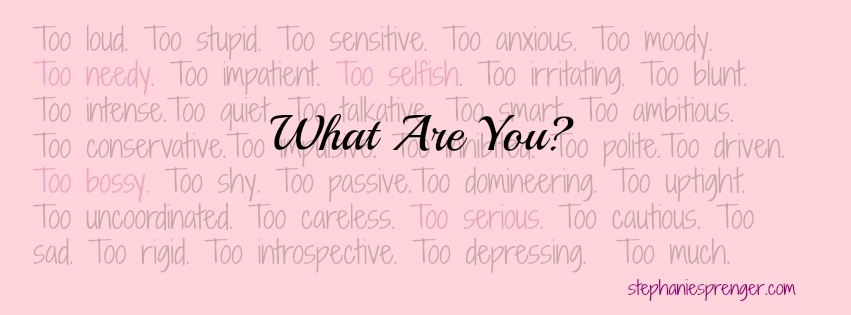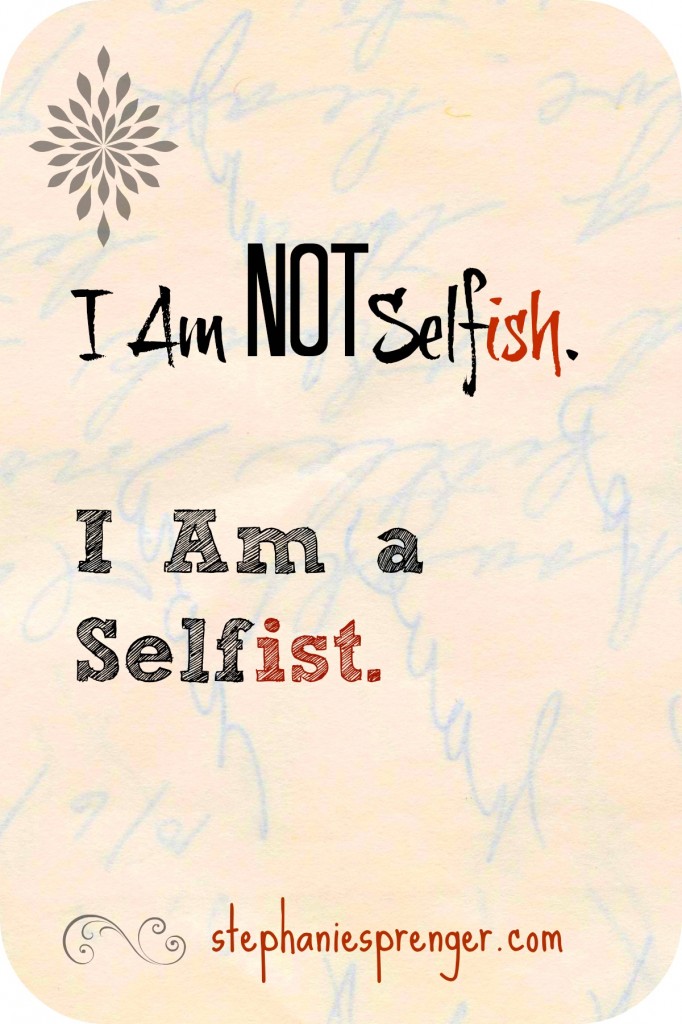One spring weekend, many years ago, before I became a mother, I sat on my crappy townhouse deck with two of my favorite people. Over some inconsequential cocktail that I can no longer recall, the three of us shared parts of ourselves with one another. We became vulnerable, daring to disclose our deepest hangups about ourselves. Each of us realized we had one “button,” one tenaciously rooted belief/anxiety about ourselves that we carried around shamefully. Each of us had a sense of “too-muchness,” and yet our anxieties were unique and reflected something important. Something we believed. Something we’d internalized. Some “work” we had to do.
I shared mine first. That I’m too selfish, I confessed. That, in my mind, was one of the most painful things another person could reflect to me. It represented the most shameful of my qualities; I worried that it was perhaps the worst of me that I could bring to any relationship or interaction.
That I’m too annoying, my first friend, the youngest of her family, contributed. Likely developed as a result of being the pesky younger sibling who was in the way- too noisy, too bothersome, too silly.
That I’m too intense, my second friend concluded. That I am simply “too much.” A deep thinker and brilliant mind, my friend was often too much for others to handle.
What’s Your Button?
It made for interesting conversation, trying to figure out the origin of these hangups we’d shared. Why did we feel that way? Was there truth to our worries? (Probably a little.) What did it mean about us, and what could we learn from them?
I’m certain that each of us has a buried concern that we are “too” something.
Too loud.
Too serious.
Too argumentative.
Too conceited.
Too flighty.
Too disorganized.
Too emotional.
Too irrelevant.
Too naive.
And perhaps we have more than one button- but I think there may be one that is the biggest, darkest quality that we fear in ourselves. The thing that makes us the most flawed. And mine is selfishness. When I was younger — a child, an adolescent, a young adult– that was the word that had the most impact when hurled at me as a criticism, a frustration, a character evaluation. So obviously, if I heard it more than once, there was some truth to it, no?
When someone “pushes our button,” it can be the most hurtful thing of all, because we believe the truth that lies within their accusation to be something that paints us as flawed, as our worst selves.
I recently spent an evening in the company of four more of my favorite people– different than the two who participated in my deck conversation a decade earlier– and the subject of selfishness came up again.
This time it was in the context of motherhood, a condition that has reframed my selfishness insecurity in new and uncomfortable ways, through a different and unflattering lens. We discussed topics and concerns that were deeply personal to me; my friends listened, they supported, they validated, they demonstrated that they really knew me.
This is the most meaningful part of life, as far as I’m concerned- taking the time to really show up for our friends, to be present, to listen to one another and reflect true understanding. In fact, the kindest thing those women did for me that night was witness my fears and false beliefs, and frame them for me in a deeply compassionate, loving way. The ultimate act of kindness, in my opinion, is spending time with “our people”, really digging with them in the emotional dirt, helping them to understand themselves better. Showing them that we see them, that we love them, that we accept them.
It’s the late night conversations, the two empty bottles of wine and Kleenex box at the ready, the communal plate of dessert. The abandoned departure time, discarded because things needed to be said. And really, getting to bed at a reasonable time never had a chance when stacked up against helping each other figure out our shit.
I once again shared with them my “button”- I am too selfish to have another baby, I confided. They sprung to my defense.
“You are not selfish!”
“Now I know someone who is selfish- and you are not anything like her!”
“Taking time for yourself as a person is not selfish!”
“Focusing on your career and dreams is not selfish.”
“You are a loving mother, and you are doing a great job.”
I smiled, and ruefully added, “OK, fine, maybe I’m not selfish. Maybe I’m just selfist. Like a Buddhist? No? No good?”
The next day I Googled my apparently made-up term to discover that it actually existed, and had been referenced in several psychology books and even Eastern religions including Taoism, one of my personal favorites. In fact, the quote given in the Free Dictionary to accompany the definition of “selfist” read as follows.
The selfist mother is one who can devote herself both to her children and to herself.
~Carin Rubenstein, The Sacrificial Mother
Selfism Vs Selfishness
So apparently selfist is a real thing. And I think I will make it my mission to wipe out selfish, at least as I apply it to myself, and replace it with selfist. Because, sure, there are people who are truly selfish. But in my own unique definition, if one is to be considered a “selfist,” they must be an advocate for the selves of people other than just themselves.
Selfists can be selfless, too. Recognizing that their own needs are important, that it is essential and even noble to pursue their dreams, view themselves as whole people, they are able to promote this awareness in others, too. A selfist encourages her husband to spend time with friends, to devote some weekend hours to pursuing something that makes him happy, (and accepting it when what makes him really happy is spending time pruning in the yard. Weirdo.) and to take care of his physical and emotional health. A selfist reminds her retired mother that it’s perfectly okay to say no to the social obligation looming that she really doesn’t have time for.
Selfism can appear to be contradictory at times, because it incorporates both ‘selfishness’ and ‘selflessness’ in their more traditional senses. Being selfist means:
- Choosing to go to yoga class on Saturday morning instead of cleaning the house.
- Saying “NO” to volunteering for the bake sale planning committee.
- Missing family dinner one night to catch up with your best friend.
- Letting your husband sleep in on Sunday because you know he’s been neglecting his own needs.
- Babysitting for your neighbor so she can go get a massage.
- Telling your son that you’d rather sit in the sun and watch him ride his bike than join him.
- Encouraging your child to try the new sport or music lesson they are passionate about.
See what I mean? Being a selfist means you value your own personal needs as well as accepting that other people’s needs matter, too. I think this can be especially contradictory for women. I recently had two interesting conversations with a couple of moms. One of them was lamenting that she’d signed up for Spanish class per the urging of a new friend of hers, and then the friend had dropped the class in order to take a gymnastics class. She felt like the other mom owed it to her to follow through with the obligation- after all, she’d only signed up so they could take the class together!
I listened sympathetically and affirmed that, yeah, that kind of sucked of her friend to bail on her like that. But then, literally the next day, another friend of mine said that she’d signed up for a preschool dance class to take with one of her close friends, and she decided to drop it because another class opened up, one where she’d be able to take both her children to the same class.
“We have so many classes and lessons each week, and it would be so much easier to take both the girls to one class,” she explained guiltily. “I’m going crazy running around so much, and it would be so much more convenient to switch to this class. But I feel like I’m letting her down- do you think she’ll be mad?”
Again I shared my support, “You need to do what’s right for you,” I told my friend. “You have three children- you give all day long. You get to make a choice that’s right for you for once. Do what you need to do.”
Almost immediately I was struck by how different this sentiment was from backing up my jilted friend the day before, and I squirmed at the duplicity in my well-intentioned support and advice. Why do we expect that our friends should always prioritize our comfort and happiness over their own convenience and sanity? Shouldn’t we support them making choices that are right for their own families, peace of mind, and quality of life, even if it pisses us off or inconveniences us?
To be clear, I’m not talking about those flaky repeat-offenders who are never there for us, constantly cancel dinner plans because “something came up,” or are always taking but never giving. I’m talking about giving our friends a break sometimes. And, just as importantly, giving ourselves a break when we choose ourselves over someone else.
That night, my four friends gave me a tremendous gift. They took a deeply rooted fear and feeling of inadequacy and helped me reframe it in a more compassionate, enlightening way. It was the most selfist thing they could have done for me.
So what do you think? Is there a difference between being selfish and being a selfist? Are YOU selfish or a selfist?
This is a subject that is very close to my heart, and one I am extremely passionate about. I was honored to be chosen as one of the BlogHer 2014 Voices of the Year with a piece I wrote about injecting “selfism” into motherhood- My Beautiful Girls: Raising Feminist Daughters.
[jetpack_subscription_form]












I must say I have a bit of selfist in me too and never realized it nor that this is an actual word. So, love that you shared this tonight and now have a new term to label myself when I do take a bit of time for me here and there. So huge thank you for that and congrats again on the BlogHer VOTY – totally week deserved 🙂
Thanks so much, Janine- on all counts! 🙂
Thank you so much for this. You have beautifully articulated the concept of being a “selfist”, which is something I’ve been trying to, well, be, I guess, even if I wasn’t naming it, especially since having children.
Kate, thanks for that beautiful comment. I really appreciate it, and I’m so glad this helped you!
What a wonderful word. I have never heard it before, but I think it sums up many moms who are trying so hard to be something to everyone, including themselves.
Thanks, Carrie. I was excited to discover it, too! 🙂
Based on this, I too am a selfist! What a revelation:). Thank you for the reframing. I can’t wait to hear what my husband says when I tell him – ha, ha.
Ha! Enjoy that conversation…. and thanks!
Dude. Yowza. I think that I am both selfish and selfist. And that both matter, at times, but also both make me feel like shit, at times. I loved picturing you on the crappy balcony years ago and with your friends, now. It made me wish I were there, being deep, with wine, and mostly, with you. Because, well, YOU.
Well, picture us instead sharing cocktails at BlogHer, roomie! It’s on… xoxo
Thank you for this. My “selfishness” is something that I have been struggling with for years until resolving to see a therapist at the beginning of this year. I was always pained so deeply by this hurtful accusation from my parents of being “too selfish”, but also terribly confused because I knew that I was a good person; I was constantly poring over my words and actions trying to figure out what I did wrong, how I could be a better daughter. My counselor helped me to realize that I am an adult, I am the joint head of my own nuclear family, I am loving, and gentle, and kind, and it is not selfish of me to do what I think is best for us (The Murphys), them (my husband and daughters) and me. I am a selfist!
Kimberly, I appreciate that comment so much, I really do. Thanks so much for sharing your experience- it sounds like you are on the right track, mama!
I loved this post, Steph. It put into words something that I have been struggling with internally for some time. I think actually think it’s vital that each of us is a selfist to some extent, because the flip side of that is self neglect and we can’t be good mothers, partners, daughters or friends if we are neglecting ourselves physically and emotionally. As mothers, I also think it’s important that we teach our children by example that it’s important to focus on looking after and loving ourselves. I haven’t been doing this very well lately am my close friends and family members have picked up on it and have encouraged me to become more of a selfist (they didn’t actually use that word, but that’s what they meant!). I think the main difference between being selfish and being a selfist is that a selfist looks after themselves for the benefit of themselves AND others around them, while a selfish person thinks solely about their own satisfaction regardless of the impact of their actions on other people.
I think you nailed it, Lizzy. Thanks for such a beautiful, articulate comment. I’m so happy that this struck a chord with you today. xo
You’ve got some good friends there in your tribe. Not many can be truly honest with each other, show their vulnerabilities, and still clink glasses at the end of the conversation. I believe we all need three types of friends: one that will drop everything to help you, one that makes you laugh until you pee your pants, one that makes you go outside your comfort zone (WAY outside), and one that will listen to you (truly listen). Sounds like you’ve got your bases covered! (Visiting from #FTSF)
Thanks, Kerith! You are right- I have an amazing tribe, and I am truly grateful for them every day!
Wow. Thank you for sharing your innermost fear and your realizations. I’m glad to see I’m not alone in this feeling. I really like your idea of selfist instead of selfish.
I’ve been practicing some of this after a similar realization last year. The idea is making a difference in my life. I’m forming friendships because I can dedicate time to them. I’m spending more quality time for my children.
Last night, when I asked my oldest daughter to sit with me, she said, “Just let me finish my game, mommy. I’ll spend a few minutes with you when I’m done. I promise.” I recognized her words as something I’ve said to her before and I was proud of her. Because sure enough, a few minutes later, she sat by me and asked me about my day. Sometimes being selfist allows us to be there for those we care about in more meaningful ways. I’m glad my five year old learned something that took me over 30 years to figure out.
You completely summed it up right here: “Sometimes being selfist allows us to be there for those we care about in more meaningful ways.” YES. I think you are so right, and it sounds like you are doing an amazing job teaching your daughters- that’s one of my biggest priorities, too. xoxo, Mama.
Hi: This is a tough one, especially for Moms. I think that Moms spend a lot of time balancing the needs of lots of people (themselves, their kids, their husbands, their friends, family, co-workers), and it can be overwhelming to deal with all of that. Under those circumstances, I think that being a selfist is a good thing — if being a selfist means being able to forgive yourself for being human and fallable.
Great post!
Thanks, Anna. It is definitely a tough one, but so important, I think!
we have to know yourself and show your kids how to give to themselves and care for others. I think the hardest thing for me (as a new mom) was admitting and accepting help. Saying I need my own time made me feel so selfish, but now I know if I don’t have that time I will implode. I love your post and explanation of selfist…love learning new words.
Thanks so much, Karen! Yes, we will implode without the time for ourselves, and then how can we take care of anyone?
Not only are you lucky in the friend department but your pals are blessed to have you in their lives. I learned a fair bit here today. Thank you. I’m loving this selfist concept. It reminds me of a good friend who years ago stunned me with her answer to my request for help. Can’t remember what the hell I asked her to help me with but I do remember her answer. “I’m going to have to say No Kel. I am sorry but I need to look after me. I’m exhausted and that would take me over the edge. So sorry. No.” Wow. I was blown away. Made me rethink my own volunteering quota. Because of her I didn’t sign up for a second run as Sparks leader. Wouldn’t that have a been a treat – especially considering my daughter had moved on to Brownies …
Thanks for sharing that story, Kelly. That’s exactly what I mean! I think most of us bristle when a friend sets a clear boundary like that, and I think it’s because we are socialized to be such “givers” all the time that it shocks us when people say no. And perhaps we’re jealous that WE don’t say no more often… Glad I’ve gotten people thinking today! And yes, I am so grateful for these pals of mine!
I sure hope there is a difference, because now that you’ve laid it out, I believe I’m a selfist too. I’ve worried about being selfish. There is someone in my life that definitely is and I strive NOT to be like that, but at the same time, worry constantly that I am. I think the difference is that a selfish person would not ever worry about that fact, but instead, feel truly justified in their own selfishness, while a selfist knows that their own self is important, but feels bad when taking time for themselves that might be at the expense of others (because their needs are important too).
Anyway, very enlightening post! 🙂
Thanks for that, Meredith, and I think you made an important distinction. It’s the awareness, the discomfort, that signals the fact that we’re not completely selfish, right? I know you and I both struggle with this one. 🙂 xoxo
Hmmm…I have often thought myself selfish, but perhaps I am a selfist. And I feel much better about that. I think though perhaps that a selfish person would not worry as much as a selfist person would about all of this, and that in itself may be a major difference. I don’t take much time for myself and I feel guilty when I do. But then again, I am always rushed with too many commitments. I need to figure out a balance. This was definitely eye opening…thank you!
Glad it made you think- this is a tough issue, isn’t it?
This was such a though-provoking post! Thank you so much for sharing such personal stories. I love reading blogs that are both encouraging and honest. I’m going to give a long think to my selfish/selfist traits and see how I can reframe things a bit… 🙂
I’m so glad you found it interesting! Thanks for that!
Well, you know I LOVE LOVE LOVE this! I love selfist, in between selfless and selfish. We need that time to ourselves, we need to take care of ourselves… and you have definitely made me think about my “button,” the thing I am “too…” because we all have it and so many of our insecurities come from that. Wonderful post 🙂
Oh yay, I am so glad you liked this one! I was really hoping you would! 🙂
This was very thought-provoking for me. My “button” is probably that I’m too sensitive. It has made me question whether I am sometimes too hard on my spouse, and my friends because I feel like my sensitivity makes me needy. This was heightened for me this past year, when I was in particular need of support and friendship. Most of my friends were right there, whether physically, emotionally or both. But, I had a few who I felt let me down. I’m still trying to figure out whether my over-sensitive nature is making me expect too much from my friends. And yeah, I’d definitely say I fall into the selfist category, which I think is a great place to be for us moms!
Emily, the “too sensitive” button is one I share with you, another one of my hangups. It’s interesting to think about, isn’t it? My sensitivity makes me question now needy I am, too, and worry that I am a burden on my friends…
OMG, I feel enlightened. This is a discovery to me, my endlessly wise friend. Honestly.
One of my biggest buttons is Selfish, as well. I remember being told that a couple of times as a child (although, come to think of it, aren’t all children?). Later in life I came to the conclusion that I wasn’t, a conclusion I’ve been recently questioning in light of some of my less expected behaviours as a mom. Reading this was both enlightening and therapeutic and reassuring.
I loved the perfect phrasing here: “This time it was in the context of motherhood, a condition that has reframed my selfishness insecurity in new and uncomfortable ways, through a different and unflattering lens.” I completely relate. I am so happy that you wrote this. Thank you!
p.s. You should totally pitch this to Huffington Post.
Oh, my friend, your comments are like soul food for me! Thank you so much for that. xo
xo. That’s exactly how I feel about yours! 🙂
oh, girl you hit so many nails on the head I don’t even know where to start!! First of all, the investment of time to really “know” and share with one another is such a beautiful thing. I know we both value the friendships among women in a powerful way.
Just as important, in my opinion, is the need to eliminate the “selfish” label that moms put on themselves or others. I feel like we are ping pong balls bouncing between feeling like we “deserve” the things we do for ourselves and feeling “selfish” for doing the things we do. But as the definition above says, a selfist mother can devote herself to both her children and herself. That’s not selfishness- that’s balance, that’s being human.
And as for the “hot button”… I once had someone tell me I had a critical spirit. That comment broke me. For 7 years I felt as if I had to prove to this person that his assessment wasn’t true. It made me miserable because I felt as though every joke or sarcastic comment said in humor just solidified his opinion. Imagine my surprise when I found out 7 years later that his comment was a joke, teasing and he didn’t even remember saying it. Needless to say, I definitely had a hot button that needed some relfection;)
Per the usual, friend, you have said what so many of us think and fear. Well done.
Vicky
Vicky, thank you SO much for such a thoughtful comment, and also for sharing! I appreciate it so much! xoxo
P.S. I had to share this. I think every mother should read this as we all walk through our days fearing that we are selfish. Let’s free ourselves and others from that, shall we?
V
Oooh, love that term! I think I’m selfist too!
My button is probably “lazy.” I was thinking “disorganized,” but I think the root shame behind that is being too lazy to get and keep things organized. My mom rarely had an unproductive moment. We didn’t have a TV, she worked full time as a nurse, baked all our bread, ran my Camp Fire group, served on committees for church and for various art groups, sewed most of our clothes, etc. When my kids go to bed, I’m on the couch with my computer or (on a GOOD day) a book. When we went to bed, she could sew interrupted. She did socialize, and we did spend a good hour or so chatting over dessert and coffee every night, but otherwise she didn’t like to waste time. I waste so much time…
I think you’re exactly right, and well said. I’m so glad there’s a word for this. It’s like that analogy about putting your oxygen mask on first in a plane emergency, then your child’s; the greatest gift you can give to your child is to show them a happy parent. And you’re clearly not selfish just because of that reference to a “communal dessert plate”–haha. I’d never be able to bear that myself. Hands off my cake, please!
I LOVE the oxygen mask metaphor- I remember crying the first time I read it in a book because it resonated so deeply with me. So powerful!
I have never heard the term selfist, but, the way you describe it here, I can see the difference. I think, as moms, we often lose ourselves in caring for others and, as “they” say, we need to take care of ourselves, too. Often, that feels selfish – to put ourselves first. But, then we tell other moms (at least I tell my friends frequently), “Good for you!” or “You absolutely deserved that!” I think they new concept of selfism is a good one. Thanks for this thought provoking post and for your VOTY nod!
Thanks, Lisa! It is such a hard one for moms, isn’t it?
You have no clue how badly I needed to read this… or how glad I am to hear “Selfist” is a real thing. Great post <3
I am thrilled that this concept is resonating with so many people- thanks so much for commenting!
I would venture to say that most days, I’m neither. When it comes to business networking, I have to do it, but often I try to do what’s best for others. My only “free” time is building my blog, talking to ladies like you online through comments. I wish I were more selfish or selfist, but taking time for myself is a struggle mentally. I feel guilty. I admire those who are selfist. I admire anyone who can put themselves before others because I know they are taking care of themselves. I admire disconnecting the needs of others from the needs of themselves.
The guilt is such a powerful opponent, isn’t it? It can really creep into everything we do without us even being aware of it… good luck!
I like this. I’m trying to be more of a selfist. I say “no” more and more everyday. The selfish thoughts creep up because I’m a people-pleaser and I tend to compare myself to other moms. But I really am becoming more and more okay with saying no. But I still wish I were further along. (Is it further or farther? I can’t remember. Probably farther. ugh).
I’m glad you are making some progress- that’s really important for you! As for further vs farther? I have no clue. :p
Okay, I know I’m a little late to this party (a lot of “selfism” involved in my last few weeks), but I had to pipe in because OMG me too. I have worried that my selfishness will make me a terrible mother, but seeing examples like you gives me hope that I can do this. As the time when we’re planning to have children grows closer, I am becoming more at peace with the idea that I don’t have to lose myself in order to be a mother.
Also, the fear of being just “too much?” I needed to read about this today, because I compromise myself so much because of this. I need to stop doing that, because I regret it every time I do.
You have no idea how happy it makes me to think that my own struggle with “selfISTness” is even remotely comforting or helpful to you as you move towards motherhood. Anytime you need a reality check as a mom who puts her needs on the table, you know where you find me. 🙂
WOW. That definition couldn’t be more PERFECT! I love that you have your “people” to be compassionately supportive of WHO you are… and I too, am so blessed to have that same compassion in my life. It’s amazing how raw that ‘button’ can be… and even more profound is the ability our friends have to cleanse it and make is less gritty and broken than we feel it is.
I am a selfist. I think all mothers should be a selfist.
Oh the guilt that stays with me when I do something for myself! I am so glad to have read this. Everything I do must be centered towards the kids and my husband. Everything revolves around them. And I have to admit it is making me cranky most days. Perhaps it’s about time I embrace selfistsm. Yup I made that word up.
Love the quote btw!
Saying no is such a powerful way to take care of ourselves. So often women feel like they have to say yes and put their needs last. It’s no more selfish to take care of yourself than to take care of others. Once I learned this, I became a much better wife and mother.